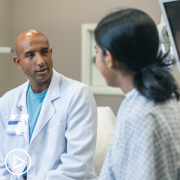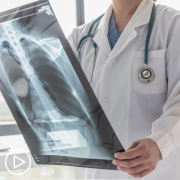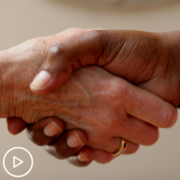How Can BIPOC Lung Cancer Patients Guard Against Health Inequities?
How Can BIPOC Lung Cancer Patients Guard Against Health Inequities? from Patient Empowerment Network on Vimeo.
How can BIPOC lung cancer patients guard against health inequities? Experts Dr. Nicole Rochester and Dr. Olugbenga Okusanya share advice for questions to ask your doctor and ways to ensure optimal lung cancer care.
See More from Best Lung Cancer Care No Matter Where You Live
Related Resource:

|

|
Transcript:
Dr. Nicole Rochester:
What are some things that patients of color can do in order to protect themselves from these inequities that you’ve talked about, starting with diagnosis and treatment, what can we do? What can patients of color do?
Dr. Olugbenga Okusanya:
So, I think the number one thing is to ask questions, the number one thing is to say, what are my options? What am I dealing with? What should I do or what shouldn’t I do? And to really make sure you get the most at that time when you see a physician, because that is really what we’re there for apart from the surgery, I’m really there to be an educator. I teach as much as I operate on a daily basis whether it be the medical training is whether in my patients, my job is to communicate information back and forth, so you really want to spend the time asking questions and getting as much information out, as much as you can. Number two is, see a specialist. There’s also very good data to indicate that as a Black patient, if you see a board-certified thoracic surgeon, you are more likely to get lung cancer surgery than if you were to see a surgeon of unknown specialization, a general surgeon. So clearly the training gives specialist the ability to make finer determinations and discernments that I think in large part favor Black and minority patients, so you want to find someone who deals with these disease processes all the time because they’re going to look at it in a much higher level and look at it with a lot more granularity.
Dr. Nicole Rochester:
Just have to repeat what you said, you said, I teach as much as I operate. That just really resonated with me, and I think that…that’s so incredibly important. Doctor means teacher, right? I think that’s the Latin…we are obligated to teach our patients, so I just really appreciate that that’s something that you incorporate in your daily practice.







